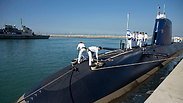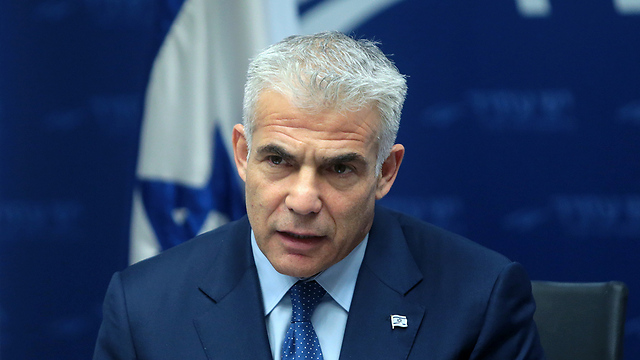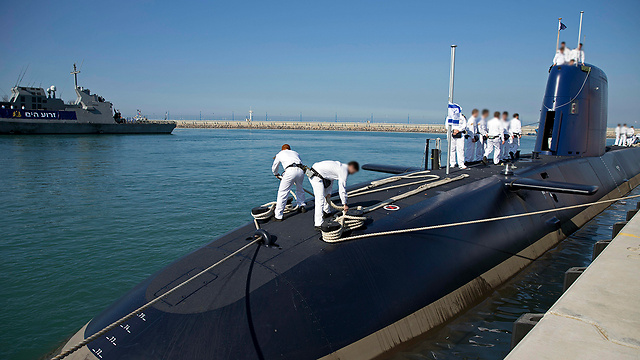
The INS Rahav
Photo: AP
Prime Minister Benjamin Netanyahu has given Germany the okay to sell submarines to Egypt, according to MK Yair Lapid (Yesh Atid), who was a minister in Netanyahu's government and a member of the Security Cabinet at the time.
Lapid claimed Wednesday that Netanyahu did not update the Defense Ministry or then-defense minister Moshe Ya'alon on the move. "One day, Israel's defense minister wakes up in the morning and discovers the Germans have gotten permission to sell submarines to Egypt," Lapid said in an interview with Channel 2 News. "They'll sail right next to our homes."
Lapid gave his testimony to the police earlier this week as part of investigations into corruption surrounding the procurement of submarines and patrol ships from German conglomerate ThyssenKrupp.
To ensure its qualitative edge remains, Israel includes a clause in every agreement it makes with a foreign government barring the seller from selling the same weapons to other countries in the Middle East.
Despite that, in 2013 the defense establishment learned Germany had signed an agreement to sell Egypt four Type 209 submarines, which were built by ThyssenKrupp and are similar to the ones Israel bought.
Upon discovering this, Ya'alon urgently sent Maj. Gen. (res.) Amos Gilad, the director of Policy and Political-Military Affairs in the Defense Ministry, to Germany to see why the Germans were in breach of the agreement.
Chancellor Angela Merkel's national security advisor presented Gilad with a document in which Israel waives the clause in the agreement that bars the sale of the submarines to Egypt.
The Germans claimed these new agreements were made during their meeting with Netanyahu's representative, attorney Yitzhak Molcho. Molcho is a partner and relative of attorney David Shimron, who is a suspect in the police investigation into the sale of the submarines to Israel.
Ya'alon then met with Netanyahu, who denied having authorized the waiver. The prime minister also raised the possibility the approval was given not by someone on his behalf, but rather by a representative of ThyssenKrupp in Israel. Ya'alon ordered an investigation into the matter, but it has not been carried out to this day.
Meanwhile, the Egyptians have already received two of the four submarines they bought.
"If anyone received money for this, it's no longer considered corruption, it's treason, because it endangers Israel's security," Lapid asserted.
Discussing the case itself, Lapid said it was "undoubtedly the biggest corruption case in Israel's history."
"We know money from the defense establishment—which belongs to our soldiers, our children—left the borders of the State of Israel, went to a bank account in Germany, moved to a secret bank account in Germany and then returned to the State of Israel. Then it went into the pocket of the lawyer of the prime minister of Israel, who is also his best friend and the man who represents him in politics, and all of this happened without the knowledge of the defense minister, the defense establishment and the Treasury," he added.
Lapid also talked about his own role as finance minister, saying "I know how to drive a hard bargain. But all this time, the Germans sitting opposite me knew the person who represents them—not me, not the State of Israel—is the prime minister's lawyer, and if a problem arises, they know it'll be resolved for them. All of this happened while we didn't know anything about it and the Defense Minister didn't know anything about it. In what other country in the world would people keep their jobs after that?"
The Likud Party responded to Lapid's claims, saying, "Yair Lapid's friends in the media work to build up his false accusations, even though it has nothing to do with the prime minister, and he is not suspected of anything."


















